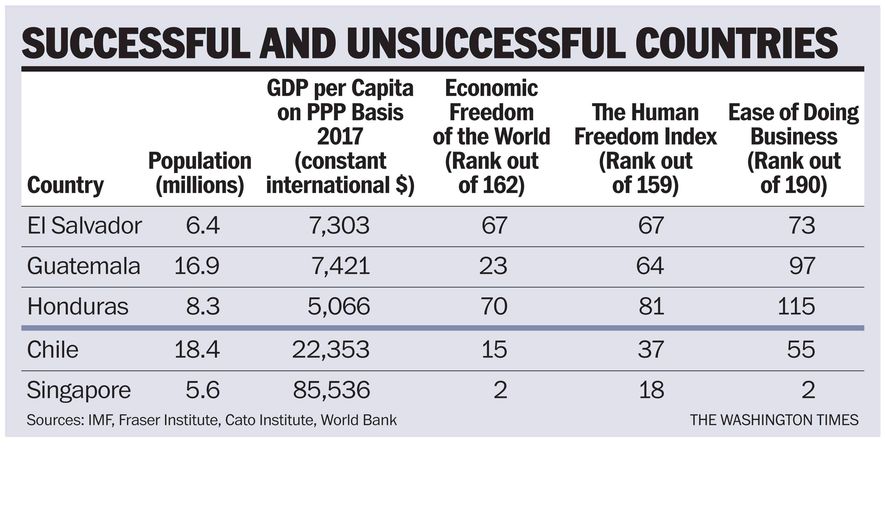OPINION:
As I write this, there is a caravan of several thousand people coming north, primarily from El Salvador, Guatemala and Honduras, with the intent of illegally entering into the United States.
Honduras has roughly a tenth of the per capita income of the United States, with few jobs and very limited economic opportunity. Despite 200 years of independence, these three countries never developed the institutions and policies to give them prosperity and liberty. (Note the attached table.) They are functioning democracies, but with considerable corruption.
The United States, the World Bank, the Inter-American Development Bank, and other foreign and multilateral institutions have provided considerable foreign aid to these countries for decades, with the goal of making them sufficiently prosperous so their citizens would no longer desire to flee to the United States. These programs have not only failed but many times actually led to more corruption.
There now appears to be a way out that is not dependent on enlightened and competent leadership or traditional foreign aid programs. The solution may well be in new technologies that enable people and businesses to do for themselves without the support or permission of their governments. Specifically, the Internet, smartphones, cryptocurrencies, blockchains, self-enforcing contracts, and e-government are allowing people to bypass the traditional heavy foot of government on their throats.
Many in Venezuela are now using cryptocurrencies to make payments and move money both within the country and internationally. The government destroyed the value of the official currency, but the people are finding ways to cope in part due to the development of cryptocurrencies.
Schools are lacking or failing to perform in many places; but now, with development of the Internet and the smartphone, anyone can have access to all of the world’s knowledge. Blockchains enable people to have secure records of land and other property ownership that cannot be stolen by others. The Internet also makes it feasible to have private courts or arbitration organizations operating in a foreign country to rule on contract disputes and help ensure justice, no matter where a person may physically live. The rise of e-government systems (initially largely developed by the Estonians) empowers and protects people and businesses from corrupt government officials.
Even though it is still very poor, Guatemala now has a per capita income a third greater than Honduras, largely because it has more economic freedom. My bet is that Guatemala is likely to show even greater relative improvement in the coming years, in part, because of one unique individual who made a difference — Manuel Ayau. As a young man, he had been sent from his native Guatemala to study engineering in the United States.
Years ago, he told me that during his time in the United States he kept trying to understand why his country was so poor and the United States so rich. After his return to Guatemala, he not only became a successful businessman, but also started his country’s first free-market think tank. Mr. Ayau had become a serious student of economics and concluded that the “Austrian School,” with F.A. Hayek as its de-facto leader at the time, had it right.
Mr. Ayau soon recognized that more than a think tank was needed, and he and some of colleagues created a remarkable university, Francisco Marroquin. The school opened its doors in 1971, with Mr. Ayau as its first president, during the long-running civil war in Guatemala. The university is named after a Spanish bishop who became a tireless advocate for Guatemalan freedom in the 16th century. The university was founded on the principles of individual rights, truth, justice, pluralism, and democracy. It has not only prospered, but now “tops the worldwide list of the fifty best places to study classical economics.”
Guatemala privatized its state-run dysfunctional telephone system and now is the best-connected country in Central America with more mobile lines than population. Under Francisco Marroquin University’s previous president, the far-sighted Giancarlo Ibarguen, it became the first university in the world to be fully connected by WiFi. The current president, Gabriel Calzada, just expanded the university by opening an additional campus in Spain — and made it the first university in the Americas to accept bitcoins for payment.
Francisco Marroquin has been in existence sufficiently long, with enough graduates to increasingly populate the leadership ranks in business, law and technology in Guatemala, to make the necessary changes to create a high-growth economy. The United States and other countries could help the reform process in Guatemala, El Salvador and Honduras, by making financial support conditional on policy changes, rather than funding infrastructure projects that are too often corrupted. Specifically, the aid donors should require much greater e-government, the temporary use of foreign judges, and an end to needless bureaucracy.
It requires at least a book to do justice to this topic and to lay out the opportunity for fundamental change. Fortunately, my old colleague, George Gilder, the economic and technological visionary, has done just that in his great new book, “Life After Google.”
• Richard W. Rahn is chairman of the Institute for Global Economic Growth and Improbable Success Productions.




Please read our comment policy before commenting.